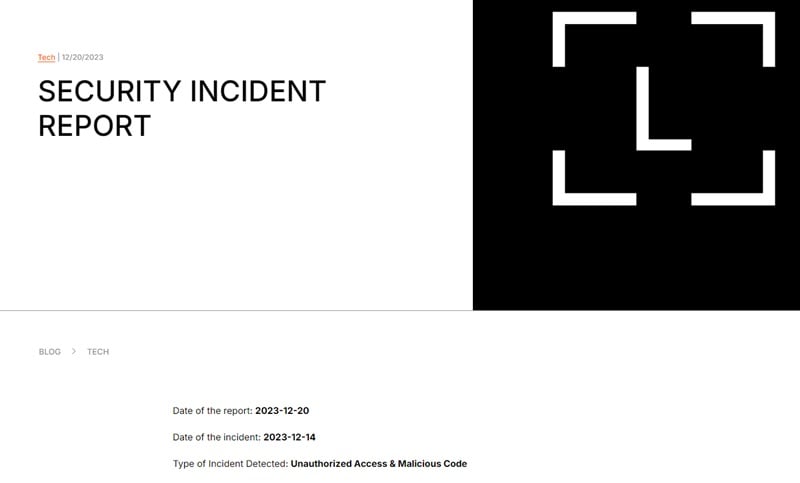In late 2023, popular hardware wallet manufacturer Ledger published an incident report regarding “Ledger Connect Kit Exploit”.

On Thursday, December 14, 2023, Ledger identified a security breach involving the Ledger Connect Kit.
This breach involved the injection of malicious code into decentralized applications (DApps) utilizing the Ledger Connect Kit, deceiving users of Ethereum Virtual Machine (EVM) DApps into authorizing transactions that subsequently emptied their wallets.
What does Ledger say?

“This exploit did not and does not affect the integrity of Ledger hardware or Ledger Live, the exploit was limited to third party DApps which use the Ledger Connect Kit.” Pascal Gauthier, Ledger CEO.
Detailed Breakdown of the Ledger Connect Kit Exploit
The Ledger Connect Kit was exploited due to vulnerabilities in its design, which could have potentially allowed an attacker to gain access to users’ private keys. By exploiting these security flaws, malicious actors could perform unauthorized transactions or steal funds directly from the affected wallets.

How the Exploit Worked:
- The exploit involved manipulating the communication protocol used between the Ledger device and the connected application.
- Attackers could insert malicious code or use phishing attacks to deceive users into approving transactions that seemed legitimate but were actually transferring funds to the attacker.
Potential Consequences:
- Complete access to the wallet’s funds without the user’s knowledge.
- Unauthorized transactions signed off by the device if the user was tricked into confirming actions.
How Users Are Impacted
Users of the affected Ledger Connect Kit faced risks of severe financial loss.
This incident underscores the necessity for vigilant security practices in the management of digital assets.
Immediate Actions to Take
- Verify Source Materials:
Always ensure that firmware updates and software are downloaded directly from the official websites. Never use links from emails or messages unless you have verified them independently. This reduces the risk of downloading malicious software disguised as legitimate updates.
- Double-Check Transactions:
Be exceptionally vigilant when approving transactions:
Always review transaction details on your hardware wallet’s screen, not just on your computer or mobile device. This helps ensure that the transaction hasn’t been altered by any malware on the connected device.
Confirm the recipient address, amount, and transaction fee. If anything looks unusual, halt the transaction immediately and investigate further.
Mid to Long-Term Considerations
Hardware Wallet Security
Caution with Firmware Updates: While it is important to keep your hardware wallet’s firmware up-to-date to protect against known vulnerabilities, exercise caution:
- Verify Before Updating: Always ensure that the firmware update comes directly from the manufacturer’s official website. Avoid updating your hardware through prompts from emails or third-party sites.
- Wait for Reviews: After a firmware release, it can be wise to wait for feedback from the community or confirmation from trusted security experts before applying the update to your own device.
Multi-Factor Authentication
Strengthen Access Controls: Using strong multi-factor authentication (MFA) methods significantly enhances the security of your cryptocurrency accounts:
- Choose Robust MFA Options: Opt for hardware-based or app-based authenticators over SMS-based methods, which are more susceptible to interception and SIM swap attacks.
- Apply MFA Everywhere: Ensure that MFA is enabled not just on your cryptocurrency exchange accounts but also on any related services that might affect your digital asset security, like email or cloud storage used for backups.
Reduce attack surface
“Complexity is the enemy of security” remains the iron law of cybersecurity.

Naturally, supporting a vast array of coins and tokens significantly increases the attack surface, presenting opportunities for skilled and persistent attackers.
If you are simply looking to store your Bitcoin for the long term, you would likely be better off choosing a Bitcoin-only device such as Coldcard or Blockstream Jade, both of which are available for direct shipping from our Vietnam warehouse.
Embracing Multivendor Multisig
For those looking for state-of-the-art security measures, consider implementing a Multivendor Multisig setup.
This approach requires multiple keys to authorize a single transaction, greatly reducing the risk if one key is compromised or lost.
Conclusion
The incident with the Ledger Connect Kit serves as a critical reminder of the complexities involved in securing digital assets.
Adopting both immediate and long-term strategies is essential for protecting your investments against sophisticated cyber threats.
Stay informed, stay secure, and consider advanced security solutions like Multivendor Multisig to safeguard your digital future.



